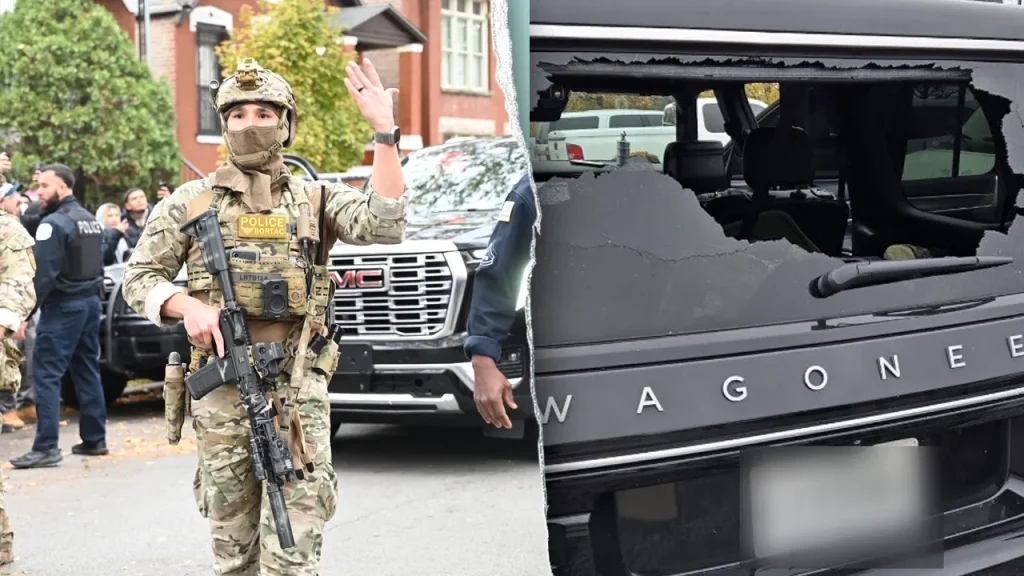Federal Agents Face Unprecedented Attacks During Chicago Immigration Operation
In Chicago’s Little Village neighborhood, a shocking series of coordinated attacks against federal immigration agents unfolded Saturday, transforming routine enforcement operations into a dangerous confrontation that has prompted a citywide manhunt and inflamed political tensions. Department of Homeland Security officials described the violence as “unprecedented” as agents faced gunfire, vehicle attacks, and projectiles hurled from rooftops during a three-hour period that resulted in multiple arrests but left the main shooter still at large.
The trouble began when federal agents found themselves boxed into a street while making an arrest. According to DHS reports, a man driving a black Jeep opened fire on the agents before fleeing the scene. As tensions escalated, crowds gathered and began throwing bricks, paint cans, and other debris from rooftops, forcing agents to deploy flash-bang devices to protect themselves. Chicago police were called in to help evacuate agents from the area. Although no officers were injured during this initial confrontation, several government vehicles sustained damage as the situation deteriorated across multiple locations in the neighborhood.
The violence quickly spread beyond the initial confrontation, with DHS reporting that their convoy faced four separate attempts to ram their vehicles. In one particularly concerning incident, demonstrators attempted to breach the perimeter of an FBI facility before police were able to restore order. Throughout the neighborhood, protesters blocked streets and continued throwing objects at federal agents, who responded with crowd control measures to clear paths for their vehicles. The coordinated nature of these attacks—occurring across several city blocks and involving different tactics—has raised serious concerns among federal officials about the safety of agents conducting immigration enforcement operations in the city.
By the end of the operation, nine people had been arrested—eight U.S. citizens and one non-citizen—facing charges ranging from assault to obstruction of federal law enforcement duties. However, the individual who fired shots at the agents remains at large, with DHS working alongside the FBI and Chicago police to locate the suspect. The department is also reviewing security protocols for future operations, acknowledging the heightened risk agents now face while carrying out their duties in certain parts of the city. Despite the violence, DHS officials emphasized that their immigration enforcement mission would continue uninterrupted.
The attacks have quickly become a political flashpoint, with Assistant Secretary Tricia McLaughlin directly blaming Illinois Governor JB Pritzker and Chicago Mayor Brandon Johnson for what she described as fostering an environment hostile to law enforcement. McLaughlin accused both officials of “fueling an environment of lawlessness and assault on federal law enforcement” and criticized media coverage of immigration operations as promoting false narratives that endanger agents. Her strong comments reflect growing tensions between federal immigration authorities and local governments in sanctuary jurisdictions, where cooperation with federal immigration enforcement is often limited by local policies.
In a defiant statement following the attacks, McLaughlin addressed those responsible for organizing resistance to immigration enforcement: “Make no mistake: Our mission will continue despite the violence. To any Antifa terrorist in Chicago: You will not stop us. You will not slow us down. And if you lay a hand on law enforcement, you will face the consequences.” This forceful response underscores the determination of federal authorities to continue operations despite growing resistance, but also highlights the increasingly volatile environment surrounding immigration enforcement actions in major American cities. The Little Village incidents represent what DHS officials describe as “a growing and dangerous trend of violence and obstruction” targeting federal agents—a development that threatens to further complicate the already contentious debate over immigration enforcement in the United States.


